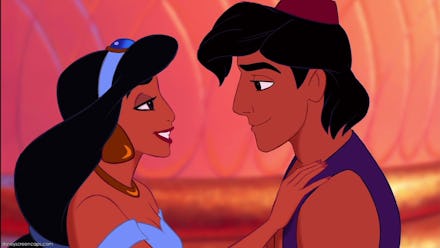'Aladdin' Is the Only Blockbuster Movie Ever to Have an Arab Hero

Try to remember the most recent movie with an Arab hero and usually, after some eye-squinting and head-scratching, only one comes to mind.
You guessed it: Aladdin. Our carpet-levitating friend with the furry sidekick was the last Arab hero in a blockbuster film, and that was in 1992, almost 25 years ago.
Since the story of the lovable street merchant, and even before, a disturbing Hollywood trend of vilifying Arab men in films started gaining momentum, often using them as the token "bad guys." From Exodus (1960) to Indiana Jones and the Last Crusade (1989) to Iron Man (2008), Arab men have fulfilled the role of "villain."
"They're the most vilified group in American history ... the Arab [represented] as the evil enemy [and] godless other," Jack Shaheen, author of Reel Bad Arabs: How Hollywood Vilifies a People and Distinguished Visiting Scholar at New York University, told Mic.
"Arabs: They are the lowest of the low. They are the vermin of American popular culture."
One in a million: Aladdin is a rare gem in that it is not only the last blockbuster film to have an Arab leading man — it's also the only one.
For the purposes of this analysis, Mic is defining a blockbuster movie as one with a domestic gross of $150 million in box office sales or more (not adjusted for inflation). After assessing all 288 movies that meet this criterion on Box Office Mojo, dating as far back as 1937, Aladdin is singular in its protagonist's ethnicity.
But even when an Arab is the hero, his far-off land is portrayed as a savage place. The lyrics in the film's opening song, "Arabian Nights," sparked a controversy and was ultimately amended after the film's release — the controversy didn't stop the lyricist and composer from winning Oscars for Aladdin.
"Oh, I come from a land, from a faraway place
And some could also argue Aladdin wasn't even all that Arab, Westernizing his name from Ala'eddin and whitewashing his ethnicity — he looks remarkably like other Caucasian Disney princes — with the exception of his exotic garb.
Reel bad guys with real bad implications: "Arabs are the most maligned group in the history of Hollywood. They are portrayed, basically, as sub-human untermenschen, a term used by Nazis to vilify Gypsies and Jews," Shaheen says in the documentary version of his book. "These images have been with us for more than a century."
Shaheen attributes a dramatic shift in stereotyping Arabs to 9/11. "The first [big change] came immediately after 9/11 ... And I blame Fox's series 24. They started by demonizing Arabs as terrorists and then they broadened it to American Muslims," he said.
"Then added to the mix was Islamophobia. Not only Arabs [were vilified], but anyone who was a Muslim, anyone who looked Muslim, like Sikhs ... if you're dark, you are fair game. So, I would say Arabophobia gave way to Islamophobia."
Muslim men terrorize not just white people, but even their own, in some films. Iron Man is depicted as the savior in the first of his eponymous movie franchise, saving innocent Afghan women and children from their dangerous men:
That's not to say America is completely impervious to bigotry. Rules of Engagement was widely regarded as taking this stereotype too far. "At its best, Rules of Engagement is merely bad, a sad and confused flick ... at its worst, it's blatantly racist, using Arabs as cartoon-cutout bad guys, and unrealistic in its depiction of a conflict in the Middle East," the Boston Globe's review said, according to the Guardian. The film made over $60 million in gross box office sales across America.
As Shaheen also pointed out, this anti-Muslim sentiment appears to have permeated every facet of American media, as evidenced by former Major League Baseball player and ESPN commentator Curt Schilling's tweet.
"It's reached a point where Curt Schilling from ESPN can equate Muslims with Nazis and you can't find it anywhere ... It's almost a hidden story," Shaheen said. ESPN responded by briefly suspending Schilling.
Shaheen said the ability for sustained misrepresentation can even influence politics and government. "It [stereotyping] makes it difficult to make decisions based on realities," he said. "[It] makes it much more difficult to make decisions in the Middle East."
To that end, the CIA beckoned him around three years ago, Shaheen recalled, to speak with analysts about the reality of the Arab identity: "My great host said the reason I was there was because CIA analysts needed to make decisions based on fact rather than fiction."
Whitewashing the silver screen: Many of the famed Arab roles haven't even been played by Arabs. These characters have often been played by a white actor for the better part of the last 100 years.
"In 1920s Hollywood, the Arab was a hero, as played by the iconic actor Rudolph Valentino in his Sheik movies," Al Jazeera writes. "By the 1970s, Arabs and Muslims were depicted as embodiments of evil, not only in Hollywood films, but in children's cartoons, the news, TV sitcoms and even on radio."
Arabs' under- and misrepresentation in American popular culture appears to make Aladdin the exception to the rule. At this point, there remains a larger issue of how culture and politics feed off one another when it comes to stereotyping this demographic. According to Shaheen, this would demand a shift in consciousness:
"I think it's a tragedy that President Obama never said, "I'm not a Muslim, but what if I were? So what? What difference would it make?'"